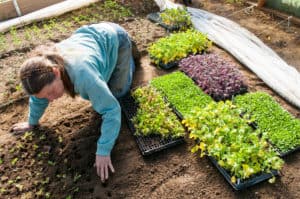Not long ago, Portland Food Co-op communicated by email with individual farmers and other local food producers to learn what fresh fare was available to stock in its coop store in downtown Portland, Maine. With about 280 Maine-based food producers as its suppliers, Portland Food Co-op, or PFC, spent a lot of time sending and answering emails, as well as sending and receiving paper-based bills and payments.
“We got their availability lists, coordinated on our end and then sent emails back to the farmers with our orders,” says John Crane, general manager. “It was fairly labor- and time-intensive.”

Maine produce farmer Jan Goranson (Photo: Kelsey Kobik)
So when PFC was approached more than a year ago by an entrepreneur planning to launch Forager, a wholesale marketplace for farm produce, Crane was intrigued, he says. “We are located in their area and do a lot of business with local farmers,” he says. “About 40% of our business is done with about 280 Maine-based food producers. Forager wanted to know our needs and frustrations, and if there was an online platform available, what it would look like.”
The entrepreneur, David Stone, incorporated suggestions from Crane and other buyers into an online portal design that, among other things, shows buyers records on what they’ve ordered from which farms. Stone launched a pilot program last summer. PFC participated in a beta test that started last July, in the heart of the Maine growing season.
The pilot program initially included seven or eight farmers and has since topped 100. Farmers and other producers on the online marketplace, which is located on the web at GoForager.com, share PFC’s appreciation of the platform, Crane says. “They are really excited because they also have businesses to run, and spending less time on a computer allows them to focus on their business. We all communicate more effectively.”
PFC and other buyers on Forager have the option to click online to make a payment after placing an online order. Alternatively, they can opt to submit a check or other form of payment after receiving an invoice that Forager sends to their accounts-payable system. In addition to enabling PFC and other buyers to place orders online, Forager generates an invoice through its order management system and signals its accounts payable software. PFC and other buyers can make payments online if they choose, he says.
PFC so far is saving 5-10% in labor costs by omitting emails and paper invoices, Crane says. That frees his purchasing staff to spend more time reviewing additional products farmers and other food producers post on the platform, leading to more variety for its customers. “Our purchasing from farmers on the platform is up at least 10%—we see things we didn’t realize they have,” he says. “And because it makes the buying process more efficient, we give preference to those who are on the platform.”
PFC and other grocers pay a monthly fee to use Forager, which is a percentage based on the size of the buyer’s company. Crane declined to disclose the amount PFC pays. Farmers post their products on the platform for free.
PFC, which started as a buying club in 2004 with 100 member owners and built its store in 2014, focuses on selling healthful foods and buying locally grown products including fruit, vegetables, meat and poultry. It now counts 4,000 member owners. The co-op’s growth and experience helped Forager founder and CEO Stone build on his mission, he says.
Stone, a co-founder of digital gift card company CashStar, established the platform to help support a revival of small local farmers as a means to influence social change. “In Maine there is a vibrant small independent farm community, and young millennials like fresh food,” he says.
In the past grocers spent 20 or more hours a week on the ordering process, and Forager provides an e-commerce tool enabling them to view products and place orders on computers and mobile devices. The portal as a “procure-to-pay” marketplace, providing buyers and sellers with records of online activity from when a buyer initially searches for items on the portal until the supplier receives payment. “We’re helping remove cost and friction from the process,” Stone says.
Sign up for a free subscription to B2BecNews, a twice-weekly newsletter that covers technology and business trends in the growing B2B e-commerce industry. B2BecNews is published by Vertical Web Media LLC, which also publishes DigitalCommerce360.com, Internet Retailer and Internet Health Management. Follow Bill Briggs, senior editor, on Twitter @BBriggsB2B.
Follow us on LinkedIn and be the first to know when new B2BecNews content is published.
Favorite